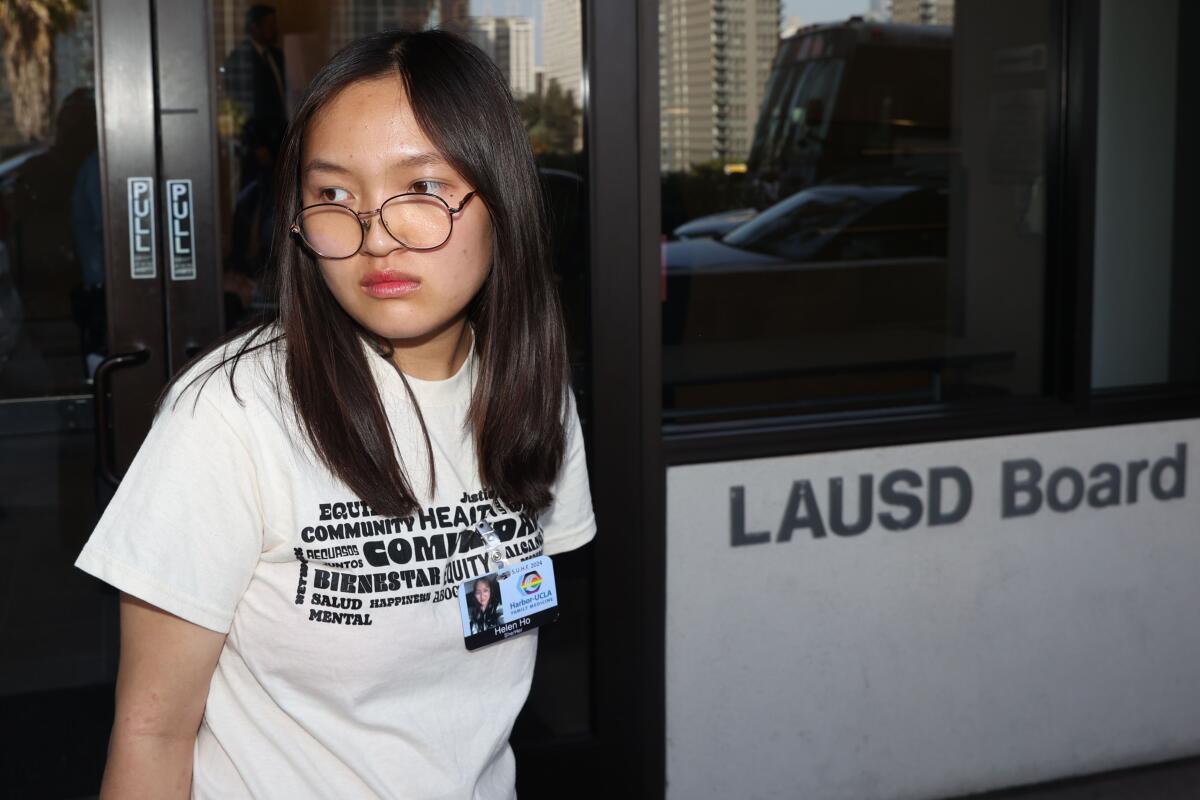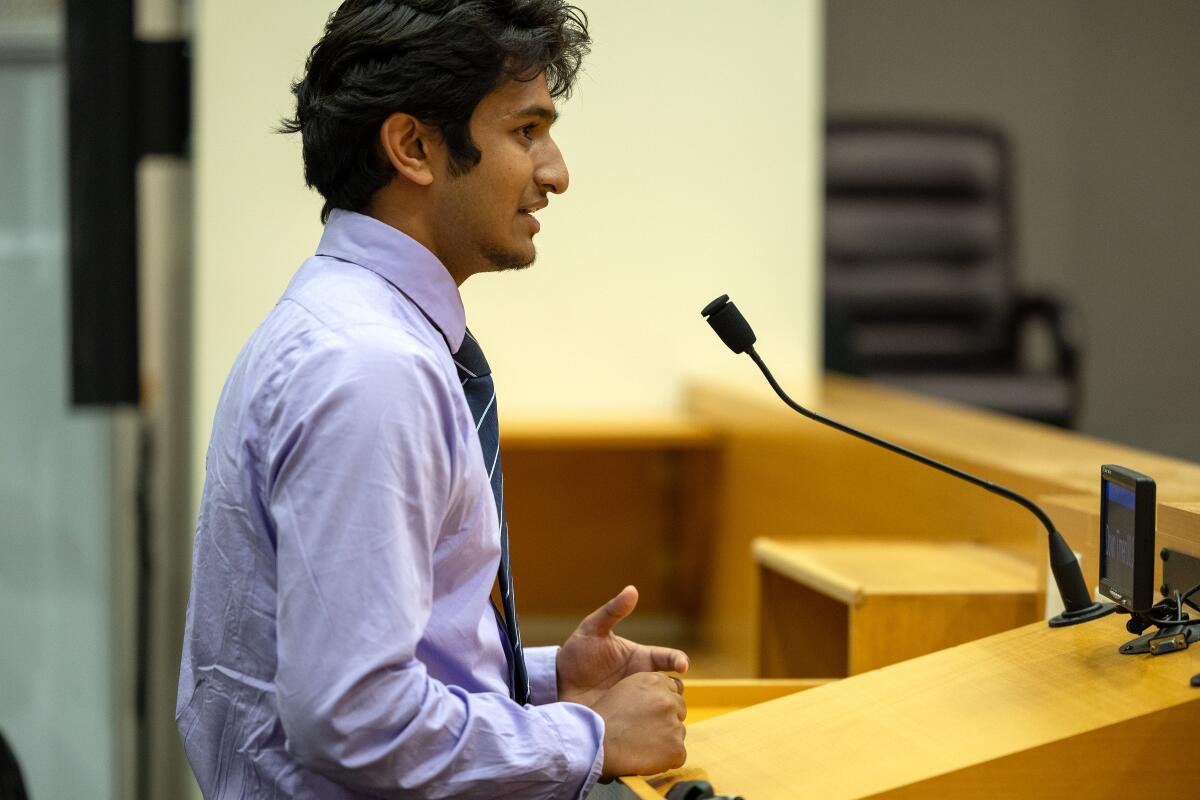Students sound off about the cellphone ban at L.A. schools

- Share via
Good morning. It’s Thursday, June 20. Here’s what you need to know to start your day.
- LAUSD approves cellphone ban. How do students feel?
- A USC student with a knife, a suspected car burglar and a deadly confrontation on fraternity row.
- We ranked every ride at Knott’s Berry Farm.
- And here’s today’s e-newspaper
You're reading the Essential California newsletter
Our reporters guide you through our biggest news, features and recommendations every morning
You may occasionally receive promotional content from the Los Angeles Times.
LAUSD approves cellphone ban, but students demand to be heard on it
Will I be allowed to bring my phone to school? Will it be somehow locked up? Can my access to social media platforms really be blocked? How will I reach my parents?
These are the questions L.A. public school students want to know after the Los Angeles school board approved a cellphone ban this week that will take effect in January 2025. The details of the policy will be worked out in the coming months, but students will be prohibited from using their phones during school hours, including lunch and breaks.
Board member Nick Melvoin spearheaded the resolution to improve learning and student mental health because “our students are glued to their cellphones,” he said.
As the policy is being drafted, the district will seek input from students, parents, staff and unions. They will have to work out how to approach different age groups and various technologies like smart watches.
Gov. Gavin Newsom has weighed into the issue and said he supports pending legislation that would require school districts to limit or prohibit student use of cellphones. His support came a day after U.S. Surgeon General Vivek Murthy called on Congress to require warning labels on online platforms because social media has become potentially damaging among young people.
Some teachers and administrators support the ban, while others say enforcement could be difficult. And some parents say they want their children to have cellphones in case of an emergency.
The one thing students agree on is that their voices need to be heard.
‘Had to get off of it’
Neel Thakkar, a rising senior at Reseda High, is receptive to the ban. He said he struggled to focus on studying for Advanced Placement exams because he was “addicted to Instagram” and couldn’t “stop picking up [his] phone ... even for two seconds.”
But the 16-year-old knew this had to stop if he wanted to pass his exams. He deleted the app from his phone because “I knew that I was addicted,” he said.
“It was very hard at first,” Thakkar said.
He also saw how difficult it has been for teachers to enforce a cellphone policy. The ban, he said, will help teachers “because there’s a larger body saying this is something we need to do.”

In comments to the Board of Education, Thakkar acknowledged student pushback.
“Students are not only able to say, this isn’t really working, this isn’t really effective,” he told The Times. “They’re also able to say, here are special cases. Here’s a niche set of students [such as students with special education requirements] that do need their phones, and this is why this policy is actually harming them.”
“It’s going to be a very hard transition,” he said. But students should “try to get on board with it because all our lives will be drastically improved.”
‘Very furious’
Helen Ho is a rising junior at Narbonne High in Harbor City, where she uses her phone for educational purposes, such as applying to programs or accessing information from fliers that often provide only QR codes, for which “you can’t use your laptop.”
She said she is “very furious.” Students use their phones for emergency situations and to communicate with their families, she said.
“Having a phone is just having stability … you’re less prone to feeling anxious,” the 16-year-old said. “It’s a source of comfort knowing that you can reach your parents.”
Her phone has also been “a pivotal tool,” she said, helping her connect with her friends, access resources and meet like-minded people from across the world. “Social media does cultivate a lot of growth,” she said.
But, she said, she has seen how it can “deter the image [students] perceive” about themselves, especially if they receive negative comments or are cyberbullied, which is “something that you can’t control.”
“You can seek out resources for that,” like online counselors, platforms, organizations, hubs and professionals who can help you get the right resources, or therapists and friends who “you have as your support mechanism,” she said.
As a student leader with Students Deserve, an advocacy group that calls for eliminating the school police, and a member of ACLU Southern California’s Youth Liberty Squad, Ho is confident that she will take action in her own school to raise awareness about the policy.
The school board should “allow students to give more input,” she said, because policies like this “significantly impact” them and can also disproportionately affect schools that have high numbers of students from communities of color.
“There’s a lot of repercussions with phone policies, but I know students can use [phones] for the betterment of themselves.”
Today’s top stories

L.A. police
- L.A. wants to make firing bad cops easier. Should the LAPD’s watchdog have a role?
Crime
- He was arrested on drug charges in Lancaster. Hours later, he was dead. His family wants answers.
- A USC student with a knife, a suspected car burglar and a deadly confrontation on fraternity row.
- Man allegedly killed by USC student on Greek row identified as investigation continues.
20 years ago at the Emmys
- ‘The Amazing Race’ continued its amazing streak.
- David Hyde-Pierce kept his streak alive.
- Drea de Matteo was dying for an award.
More big stories
- California has a history of racist land seizures. A California state lawmaker wants to help victims get justice.
- Wildfire risks in California heightened by upcoming heat dome.
- Pandemic-era meal delivery program is set to end. Thousands of L.A. seniors could go hungry.
- Disney told L.A. residents to move to Florida for a planned campus. They did, it was canceled and now they’re suing.
- Sixty years ago, a photographer rolled with a biker gang. Now his life is a movie.
- Airline passenger flew to Burbank, but her luggage landed in a Hollywood homeless encampment.
- Sparks rookie starter Cameron Brink suffers torn ACL, expected to miss season.
- Massive makeover of L.A. Convention Center moves ahead as Olympics loom.
- Shasta Indian Nation to get homeland back in largest land return in California history.
- Downtown L.A.’s graffiti-covered Oceanwide Plaza is a real estate disaster. Can it be saved?
- Kendrick Lamar reps L.A. unity at Kia Forum, performs “Not Like Us” marathon, brings out Dr. Dre.
- In test case between state climate goals and freeway expansions, new lanes win.
- Rancho Palos Verdes bans bikes and motorcycles from road as landslide causes it to shift and crack.
Get unlimited access to the Los Angeles Times. Subscribe here.
Commentary and opinions
- Shelby Grad: Journalism does not have to be this bad: A lesson of truth over money from Orange County
- Michael Hiltzik: How anti-union Southern governors are violating federal law.
- Lorraine Ali: Go ahead MAGA influencers, trash L.A. for likes. We’ll always beat you at the fame game.
- Gustavo Arellano: Five families sued to desegregate O.C. schools. Why is just one remembered?
Today’s great reads
They fled war, then found new hope through Shakespeare’s toughest play. Displaced by war, these Ukrainian amateur actors play their blood-red version of the bard’s toughest tragedy for the Royal Shakespeare Company.
Other great reads
- In legal quest costing millions, an O.C. bishop accused a fellow Catholic of libel.
- She sang for ‘El Chapo.’ Now the cartel kingpin’s lawyer wants to be a ranchera star.
- Want to be fearless? Try this fierce Zen priest’s belly button trick.
- How Lego went from humble toy and destroyer of bare feet to black market item thieves target.
How can we make this newsletter more useful? Send comments to essentialcalifornia@latimes.com.
For your downtime
Going out
- 🎢 We ranked every ride at Knott’s Berry Farm.
- 🏨 Hotel and Airbnb price tags may soon spike. That’s a good thing for travelers.
- 😊 Do you have a ‘happy place’ in L.A.? We want to hear from you.
Staying in
- 📚 5 mysteries to read this summer — and their authors reveal their reading lists
- 🔊 Dhani Harrison awakens new sounds and spirituality with help from Tuvan throat singers.
- ‘Slave Play’ shocked and provoked. The ‘Slave Play’ documentary on Max aims for the same.
- 🧑🍳 Here’s a recipe for Chickpea Salad Bowls With Cucumbers, Feta And Za’atar
- ✏️ Get our free daily crossword puzzle, sudoku, word search and arcade games.
And finally ... from our archives
On June 20, 1975, Jaws opened in theaters. Here’s an exerpt from the original L.A. Times review by critic Charles Champlin:
“It is a coarse-grained and exploitative work which depends on excess for its impact. Ashore it is a bore, awkwardly staged and lumpily written.”
Have a great day, from the Essential California team
Defne Karabatur, fellow
Christian Orozco, assistant editor
Stephanie Chavez, deputy metro editor
Karim Doumar, head of newsletters
Check our top stories, topics and the latest articles on latimes.com.
Sign up for Essential California
The most important California stories and recommendations in your inbox every morning.
You may occasionally receive promotional content from the Los Angeles Times.









